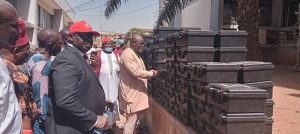Nigerian electoral body, the Independent Electoral Commission (INEC), on Thursday, announced that it had deployed 2,822 the Biometric Voters Accreditation System (BVAS) for the Federal Capital Territory (FCT) Feb. 12 council elections.
The News Agency of Nigeria (NAN) reported that 1,373,492 registered voters were expected to participate in the elections for Chairmen and Councillors, in 2,229 polling units .
INEC Chairman, Prof. Mahmood Yakubu, who was at the distribution of the sensitive materials to the area councils, said that 12,000 ad hoc staff had also been deployed for the elections.
Yakubu said that the sensitive materials were collected from the Central Bank of Nigeria (CBN) and brought to INEC FCT office, for distribution to the area councils.
“The materials were received from CBN and are being taken to the area councils starting with the farthest, Abaji, kwali to Gwagwalada area councils.
“There are six area councils Abaji, Bwari, Gwagwalada, Kuje, Kwali and Abuja Municipal Area Council(AMAC)’’, he said.
Yakubu explained to foreign observers that although the election was a local government one and not so big, but the area councils were large areas that could amount to a country.
“One area council alone like AMAC is almost the size of Guinea-Bissau in Africa, so we still had to do some serious work.
‘`However, we have taken adequate care and decongested some polling units for the elections and we hope that the political parties have mobilised, so that there would be high voter turnout.
“Our responsibility is voter education, while their responsibility is voter mobilisation,’’ he said.
INEC’s National Commissioner for Information and Voter Education (IVEC), Festus Okoye, said that the deployment of the sensitive materials was being observed by representatives of political parties, civil society groups and the media.
“This is because we want to be as transparent as possible and we also want to be as fast as possible so that the vehicles can leave.
“The security agents that would escort the vehicles are ready, political parties and CSOs are welcomed to escort the vehicles to their destinations.
“When they get there the materials would be offloaded and kept under heavy security pending when they are deployed to the Registration Area Centres (RACs).’’
Mr Abdulrazak Yusuf, Director in charge of Electoral Operations, said that the sensitive materials included result sheets and ballot papers, customised in different colours according to the area council.
yusuf said that each ballot paper and result sheet differed from one area council to another council and had been colour coded, adding “so the one for kwali differs from the one of gwagwalada in colour and the other local governments.
“we also have replacement result sheets produced, based on percentage in case something happens we can easily have sheets to record our results.
“they are usually left with the resident commissioner supervising that local government in addition to the six supporting the rec, so that the form would be with him, but it will not be is an issue with one result sheet that they will be counter signed and replaced .’’
Yusuf said that INEC had a checklist containing the names of all polling units and ballot papers with their serial numbers and the number of result sheets that would be used.
He added that each polling unit had its own customised and unique feature with its own delimitation.
“So, we cannot use a result sheet of 001 for 002 because it has been customised according to that Polling unit,’’ he said.

















Discussion about this post